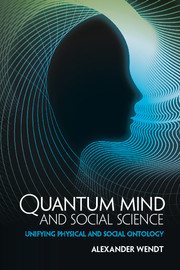Book contents
- Frontmatter
- Dedication
- Epigraph
- Contents
- Acknowledgments
- 1 Preface to a quantum social science
- Part I Quantum theory and its interpretation
- Part II Quantum consciousness and life
- Part III A quantum model of man
- Part IV Language, light, and other minds
- Part V The agent-structure problem redux
- Conclusion
- Bibliography
- Index
1 - Preface to a quantum social science
Published online by Cambridge University Press: 05 May 2015
- Frontmatter
- Dedication
- Epigraph
- Contents
- Acknowledgments
- 1 Preface to a quantum social science
- Part I Quantum theory and its interpretation
- Part II Quantum consciousness and life
- Part III A quantum model of man
- Part IV Language, light, and other minds
- Part V The agent-structure problem redux
- Conclusion
- Bibliography
- Index
Summary
Why are we here?
Almost from its inception as an academic discipline in 1919, International Relations (IR) has featured “Great Debates” about what we today would call the relationship between ideas and material conditions, human agency and social structures, and naturalist and anti-naturalist modes of inquiry. While often disparaged as mere “meta-theory,” at least implicit positions on these essentially philosophical questions play an important role in the field. Intellectually, they structure our substantive theorizing, methods, empirical findings, and ultimately the normative and policy implications we draw from our research; and sociologically, they affect who we hire (and sometimes, fire), where we publish, and how we train our graduate students. Unfortunately, despite considerable disciplinary investment in meta-theory since the 1980s, from my own vantage point, as someone who has been involved in these debates for 25 years, I see no progress toward ending them. IR scholars have a better sense today of what the issues are and how, why, and when they matter, but the debates remain as intractable as ever. When it comes to the ontological and epistemological foundations of IR scholarship, we are in a “Land of Confusion” from which escape is nowhere on the horizon.
Of course, the confusion is not IR's alone, but the social sciences' as a whole. Although over the years sociologists, economists, political scientists and others have acquired better data and statistical techniques that have significantly improved empirical understanding of trends and relationships in society, social scientists' ability to cumulate deeper, theoretical knowledge has lagged seriously behind. This is true even in economics, where despite greater theoretical homogeneity, vigorous heterodoxies survive. In contrast to physical sciences like chemistry or geology, where there is broad agreement on the nature of reality and how we should study it, in the social sciences there is no such consensus.
- Type
- Chapter
- Information
- Quantum Mind and Social ScienceUnifying Physical and Social Ontology, pp. 1 - 38Publisher: Cambridge University PressPrint publication year: 2015

